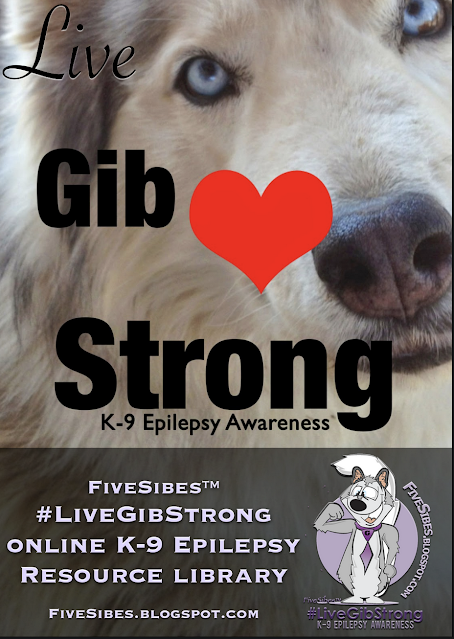#NEAM: #EpiStar Raider Is Living Life Beating the Seizure Monster!
by Dorothy Wills-Raftery
.png) According to Dr. Karen Muñana, Professor of Neurology at The Companion Animal Epilepsy Research Lab at North Carolina State University-College of Veterinary Medicine, and member of the International Veterinary Epilepsy Task Force, "What we tend to see
most commonly in dogs is a disease called “idiopathic epilepsy,” and
that is where the brain appears structurally normal — from what we can
tell with testing such as MRI — but at a microscopic level or cellular
level, there are some abnormalities. Idiopathic epilepsy can occur in
any breed, but we see it more in certain breeds where it has been shown
to be inherited."
According to Dr. Karen Muñana, Professor of Neurology at The Companion Animal Epilepsy Research Lab at North Carolina State University-College of Veterinary Medicine, and member of the International Veterinary Epilepsy Task Force, "What we tend to see
most commonly in dogs is a disease called “idiopathic epilepsy,” and
that is where the brain appears structurally normal — from what we can
tell with testing such as MRI — but at a microscopic level or cellular
level, there are some abnormalities. Idiopathic epilepsy can occur in
any breed, but we see it more in certain breeds where it has been shown
to be inherited." Becca shares that before Raider began his prescription medication, "There were things we did and continue to do in order to try to prevent triggering him, even though I’ve never honestly found a true trigger."
And while most times with idiopathic epilepsy, the cause or triggers are unknown, it is the goal of every Epi-dog caregiver to try and eliminate things that could be possible triggers in the hopes that the mystery one is found. Sometimes it is, and sometimes it isn't. That is the nature of the beast dubbed "the seizure monster."
Becca notes that they adhere to a strict schedule and try to avoid stressful situations, which are both very important when you are caring for an Epi-dog. Therefore, with Raider, "He eats at the same time every day. We try
to keep him stress free. I refuse to burn candles or use wax melts. I clean
with natural products. He eats high value dog food. I make sure we have no toxic
plants that he, or his five other siblings, can get into. He and his three sisters (they are all
siblings-same parents-different litters) all have the MDR1 gene and the
side effects of Ivermectin in heartworm prevention has been known to cause
seizures and even death, so no standard flea/tick and heartworm prevention can be given."
Many times, being on the much-needed anti-seizure medications can sometimes alter an Epi-dogs mood or nature. Says Becca, "Before he was put on prescription meds, Raider was super playful. I feel like the vestibular event unfortunately really messed with his brain. He is a very chill dog now. He does still love to play with tennis balls and occasionally plays with his siblings, but most of the time he’s getting on to them to chill out though!"
"I wouldn’t change anything. So many people asked
why we don’t put him down with all of the stress (financial, not sleeping,
etc.), well, he is my heart and soul. I wouldn’t put my child down just because
they have Epilepsy. As long as he has quality of life, and he does, I will not
put him down." ~Becca Crigger
As many of us who care for an Epi-dog know, it does require a change in daily routines—from being ever-vigilant of our dogs food and surroundings, to a strictly enforced timed medication schedule, to watching out for and reducing possible triggers ranging from foods, to environmental, dog-care products, and being prepared for certain weather and atmospheric changes, and Becca is no stranger to this.
"Of course our lives changed after his diagnosis. Everything we plan has to revolve around his medication schedule. I was fortunate to begin working from home in 2020 and can keep a close eye on him. Even though he is doing so well, I am terrified to leave him and start working outside the home again. I still get triggered if he dreams and starts moving or whines in his sleep. The fear never goes away that he will have another seizure."
And how does the rest of the pack react when Raider has a seizure? "They are interested in what’s happening, but thankfully don’t attack him or anything as I’ve seen happen to others with multiple dogs. We do separate them just in case," notes Becca. "But, here’s an interesting thing, one of his sisters, Hazel, alerts me to him having one. It is truly incredible."
With all the worry, would Becca change anything?
"I wouldn’t change anything. So many people asked why we don’t put him down with all of the stress (financial, not sleeping, etc.), well, he is my heart and soul. I wouldn’t put my child down just because they have Epilepsy. As long as he has quality of life, and he does, I will not put him down. I will never understand those people who do."
Becca also praises her veterinary neurologist. "Raider's neurologist is absolutely phenomenal. Although she is three-and-a-half hours away, she fortunately consults with me over the phone. She will also call and consult with my veterinarian."
That type of positive attention and communication with an Epi-dog's veterinarian and veterinarian neurologist is so important as it is not only helpful to the Epi-dog, but also to the caregiver to know they have a team of vets who share information and seek out the best possible care routine with the Epi-dog caregiver to determine what's the best course of treatment for a dog with epilepsy.
While this video Becca posted on Instagram (@Becswolfdogs) was from October 18, 2024, when Raider was 20-months seizure free, in speaking with Becca, Raider is holding strong and will be 21-months seizure free on November 18th!
Rock on, Raider!
Caregivers of dogs with epilepsy are amazing folks. It's so important to remember to care for yourselves, as well as your Epi-dog! Please be sure to watch my special slideshow "Caring for the Epi-Dog and Caregiver: The Importance of Self-Care"
If you are looking for information on Canine Epilepsy, check out our FiveSibes #LiveGibStrong K-9 Epilepsy Online Resource Library where you will find accurate and vetted information you can trust including links, articles, podcasts with vets and veterinary experts, helpful tips, bookmarks, where to go if you need financial help with epilepsy medications,. Epi-Star success stories, and much more. It's a great place to seek out information so that you can have an in-depth conversation with your vet about your Epi-dog's care.
💜
💜
Other Stories in the Epi-Star Series:
FOLLOW US ON FACEBOOK: FOLLOW US ON INSTAGRAM:
FOLLOW US ON FACEBOOK: FOLLOW US ON INSTAGRAM:






















What a beautiful boy Raider is! 21 months and going strong. Very cool! ♥ My best wishes to Becca, Raider ad family.
ReplyDeleteGood for you Raider, keep on being the wonderful you!
ReplyDelete